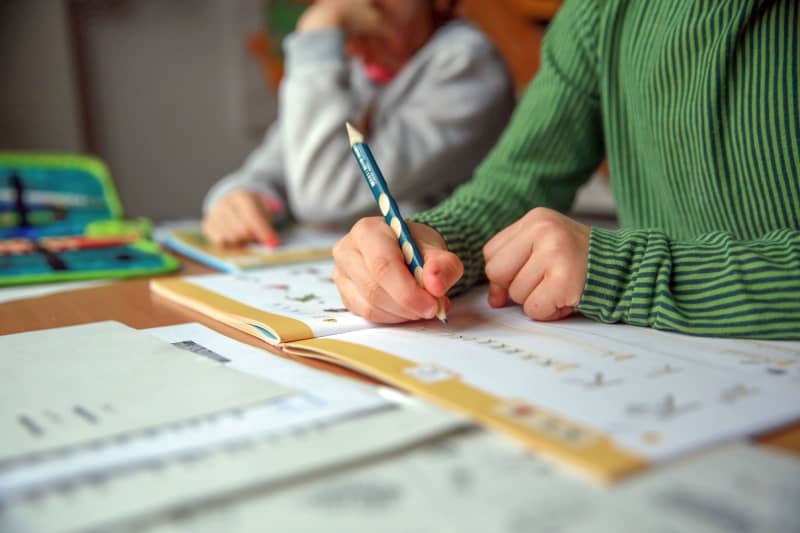Is your child dyslexic? An expert spells out what to do

Your child may sometimes write the word "dog" with two o's in the middle instead of one, and other times "dgo" or perhaps "bog." Then know this: Spelling the same word wrong in different ways is a red flag.
"It's a typical sign of dyslexia," says Annette Höinghaus, spokesperson for the German Dyslexia and Dyscalculia Association (BVL).
Misspellings of this kind distinguish the child from one who, for instance, always writes "doog," an error they may have acquired on account of emotional stress, a change of school, long absence from classes due to illness or similar circumstance.
"The spelling disability is caused by the brain's difficulty processing and remembering words," Höninghaus says, so the child keeps having to relearn them.
Dyslexia is a learning disorder that mainly involves reading and spelling. Children who have it must expend an inordinate amount of energy practicing these skills, as "they have trouble forming syllables from letters," points out Höinghaus.
This doesn't go unnoticed by parents of a dyslexic child who reads very slowly and haltingly, and can't grasp the meaning of the text. The child has to put all their effort into simply reading it correctly.
What exactly goes on in the child's brain? Brain regions making up what's known as the language centre aren't activated as in a non-dyslexic brain. Neural pathways there are less efficient.
"Due to a neurobiological disorder rooted in a genetic defect, what the child reads isn't properly stored," explains Höinghaus, likening the disorder to colour blindness.
She advises parents of children who struggle with reading or spelling to have a psychotherapist or paediatric psychiatrist look at the problem. Considering the child's age and class level, the specialist will check whether the cause may be something other than dyslexia, such as emotional stress from bullying or parental divorce/separation.
Hearing or vision difficulties, or a lack of concentration as a result of attention-deficit/hyperactivity disorder (ADHD), can also be the reason for "normal" reading or spelling errors.
A reading and/or spelling disability often remains long unrecognized, which exacerbates the problem. "When children struggle to read fluidly, reading isn't fun for them and they avoid it," remarks Höinghaus, who says a typical avoidance strategy is asking to be read to - and just looking at the pictures in the book.
Dyslexia among schoolchildren is hardly uncommon. "We estimate that 10% to 12% have the disorder, about 5% of them with a reading disability only, about 5% with a spelling disability only, and the rest with both," Höinghaus says.
The good news is that with extra help in school or individual tutoring, most dyslexic children can attain the average level of their peers' reading and spelling skills within two years or so, according to Höinghaus.
"Unfortunately, this rarely happens though," she says. "Either there aren't enough teachers, the teachers don't have enough time, or they lack the necessary competency."
She offers some tips on helping children with a reading and/or spelling disability.
Six ways to mitigate a reading disability:
1. Books should be in large print, with at least a 14-point font and no serif typefaces with horizontal tapers on letters, such as are found in Times New Roman or Garamond, for example. Line spacing should be at least 1.5 times the font size, "otherwise dyslexics often slip down to the line below."
2. Parents should ask teachers if they could format texts accordingly. Worksheets shouldn't be crowded with text or have different things copied onto a single page.
"Merely seeing this is stressful for dyslexic children," warns Höinghaus, adding that a closely written A4 page doesn't motivate them. "Quite the contrary, if a page is overloaded, they think there's no way they'll be able to read it."
3. Teachers shouldn't require that everything be copied from the blackboard. Otherwise dyslexic children might be unable to follow the lesson, being "blocked" by trying to copy it all down.
They may also have difficulty copying homework assignments from the blackboard. If so, they should be allowed to photograph the blackboard with a smartphone or have the teacher send them the assignments by email.
4. In the digital age, worksheets should be sent to pupils' tablet computers - on which fonts can be changed as desired. "If all of the pupils get them this way, a dyslexic child won't stand out from the others," Höinghaus says.
5. To make reading fun for dyslexic children, parents can make use of their hobbies. If the child likes, say, horses, detective games or football, they should read books on the subject together - "ideally by taking turns, the parent reading a larger part, the child a smaller one," suggests Höinghaus.
This will help the child to understand the book's content.
6. If the child goes on to a secondary school, text-to-speech software can be used.
Three ways to mitigate a spelling disability:
1. Go over spelling rules, eg i before e except after c or when sounded like "a" as in "neighbour" and "weigh" (among other exceptions), or q is (almost) always followed by u. Learn word prefixes and suffixes, eg trans- and -ness, in chunks. Find smaller words in bigger ones, eg "hen" in "when" or "key" in "monkey."
2. Practice reading aloud, starting with shorter and simpler passages.
3. Learning a foreign language presents special challenges, needless to say. Since words' spelling often deviates greatly from their pronunciation - English is notorious in this regard - you can ask the teacher to examine the dyslexic child orally.
"This tells the teacher whether the child has indeed learned the vocabulary words, committing them to memory phonetically," Höinghaus says. Rejecting this examination approach, she argues, unfairly penalizes the child.



